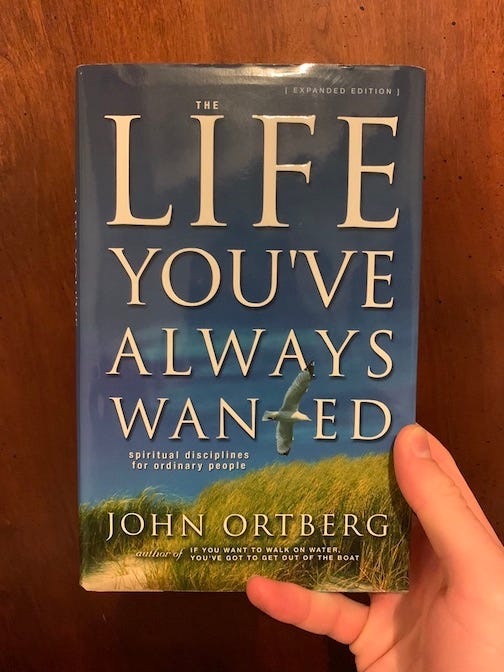The Life You’ve Always Wanted by John Ortberg

I had this book for a couple years before I decided to read it. I learned a lot of things and loved the messaging throughout the book. T9his was a book that gave me a lot of important things to think about and remember.
I think that this is so so important and so so true.
Pg. 20, Psychologist Aaron Beck says that the single belief most toxic to a relationship is the belief that the other person cannot change.
I highlighted this from a portion of the book that talked about the author spending time with someone in a hospital who would recite the Bible and even in the midst of pain and imminent death, she would praise.
Pg. 23, and often when I would pause she would continue reciting the passage from memory, word-for-word. I never heard her speak of loneliness or pain except in the stress she placed on certain lines in certain hymns.
Here is what he wrote next about her which just left me in awe and inspired me.
Pg. 24, So I went to her and asked, “Mabel, what do you think about when you lie here?”
And she said, “I think about my Jesus.”
“I sat there, and thought for a moment about the difficulty, for me, of thinking about Jesus for even five minutes, and I asked, ‘What do you think about Jesus?’ She replied slowly and deliberately as I wrote…
“I think about how good he’s been to me. He’s been awfully good to me in my life, you know… I’m one of those kind who’s mostly satisfied… Lots of folks wouldn’t care much for what I think. Lots of folks would think I’m kind of old-fashioned. But I don’t care. I’d rather have Jesus. He’s all the world to me.”
I loved the closure that the author placed on the story about Mabel,
Pg. 25, This is the twenty-third Psalm come to life: “the Lord is my shepherd, I shall not want.”
Wow. How many? Probably a lot of people. We are called as Christians to live differently, why don’t we?
Pg. 35, How many people are radically and permanently repelled from The Way by Christians who are unfeeling, stiff, unapproachable, boringly lifeless, obsessive, and dissatisfied?
I liked the examples that the author chose from the Bible and think that reminding us of why people were drawn to Jesus is so important.
Pg. 37, “They love… to have people call them rabbi.” Jesus had a kind of differentness that drew people to Him. True spirituality is the way.

The author shared this point of reflection and I believe that it is so important for us to live and live each and every day.
Pg. 60, I realized that I tend to divide my minutes into two categories: living, and waiting to live.
The original wording in Genesis when it says that God rested signified resting out of completion not out of exhaustion.
Pg. 62, And at the end of the week, God was seriously burned out. So, He breathed a big sigh of relief and said, “Thank Me, it’s Friday.” Of course, Genesis looks nothing like that. Instead it throbs with the refrain, “God said, … And it was so… and indeed, it was very good.”
I think that this is so so true and just incredible to consider. I believe that the way to feel authentic joy is truly compatibility with pain and I think that is an amazing to ensure that there is true joy. Some of the greatest people in the Bible experienced joy throughout some of the most difficult times that we could imagine.
Pg. 68, True joys, as it turns out, comes only to those who have devoted their lives to something greater than personal happiness. One test of authentic joy is it’s compatibility with pain.

As Francis Chan said, “Let’s stop calling it a “busy schedule,” or “bills,” or “forgetfulness.” It’s called evil.”
Pg. 76, “You must ruthlessly eliminate hurry from your life.”
I love the clarification here, we are all called to help each other.
Pg. 118, That is the kind of servanthood Jesus calls us to — a society of sinners helping each other.
I think that this was a reference to servanthood that the author shared on the previous page, I love the point of it, the glory is never ours to have, nor should it be.
Pg. 119, If I do this, I become a little less addicted to having to have my own way. I become freer to serve someone else without thinking, “Wow, what a wonderful husband and father I am!”
I loved this point, it is so important. God calls us to lift up others and support others. We will not always be pleased, satisfied, or filled with love — but we are not called to do so.
Pg. 124, We are called to bear each other’s burdens. Sometimes this may involve praying for another’s need, or trying to comfort someone in pain. But at times it may feel as if an entire relationship is burdensome. I may need to “bear with” people until I learn to love them.
As they continued on the explanation about bearing each other’s burden I like this very important perspective. God speaks through everyone and everything, if we seek Him.
Pg. 125, The ministry of bearing with one another is learning to hear God speak through difficult people.
Nothing to add here besides, I love it. I relate. I am sure that we all have been in a situation where we feel as though we are a savior and to me, it’s always good to know that it is not our responsibility to save anyone, Jesus already did.
Pg. 126, Every human being who has ever lived has suffered from a messiah complex — except one.
The Bible says, “In Christ we who are many form one body, and each member belongs to all the others.” We were never designed to be alone.
Pg. 127, “He who is alone with his sins is utterly alone.” — Dietrich Bonhoeffer
I love the specificity. To truly change, to be different, to be better, we must take ownership entirely and completely.
Pg. 131, One, “I lied to my boss and said I was working when I wasn’t because I wanted to avoid trouble,” Can bring about more honesty and change than twenty variations of. “I haven’t been truthful enough.”
I think that this was one of the most important parts of the whole book for me. Often we might think or believe that someone else should do something or change something. I love the song by Matthew West called ‘Do Something’. In the song, Matthew asks God, “Why don’t you do something?” before responding in the next verse of the song with God’s response being, “I did, I created YOU.”
Pg. 133, We can lie to avoid pain and hardly be aware we have done so. We can flatter or seek to manipulate almost without even being aware of it, as if functioning on autopilot. We can ignore injustice or human need for long stretches of time without any moral warning lights going on.
So in this step of confession, we ask for honest perception. We want to see our sins through a new lens. We begin to see them through the eyes of the person we sinned against. We struggle to see them through the eyes of God.

This were some very important questions that once again makes us think of the verse in Proverbs about seeking counsel. We cannot always see things as they truly are for ourselves nor can we determine for ourselves the areas for improvement.
“The way of a fool is right in his own eyes, But a wise man is he who listens to counsel.” — Proverbs 12:15.
Pg. 148, How do I become a more truthful person?
Whom do I know who can teach me to pray in a way that will nourish my soul?
What practices will enable me to live in joy continually?
I like this short list of things that we need to practice each time important decisions are faced. God is shown in the Bible to reward to preparation. It’s up to us to work as if it is all up to us and pray as if it is all up to God — knowing that both go together.
Pg. 149, When we face important decisions, we must pray, seek guidance, and exercise judgment, wisdom, initiative, choice, and responsibility.
We must seek God’s guidance for this, we cannot by ourselves, determine what needs to be done to seek first the kingdom. After all, we have never seen the kingdom, but God resides there.
Pg. 152, It only makes sense to ask God for guidance in the context of a life committed to “seeking first the kingdom.”
I wonder how different the world would be if we always remembered this. Showing an act of love to another person could be a way for God to speak to that individual, couldn’t it?
Pg. 153, God speaks not only to us but through us.
This is so important. We must remember that earthly praise and approval means nothing. What matters more than that is the (hopeful) approval that God will give us come judgement day. The best praise that we could ever receive is God welcoming us to heaven alongside Him and saying, “Well done, good and faithful servant.”
Pg. 166, Receiving praise gracefully, without becoming an addict, requires a well-ordered heart.
Comparison: Approval addicts find themselves measuring their accomplishments against those of other people
It is a form of spiritual bulimia — always craving more, but never satisfied
Deception: If we are approval addicts, our concern for what others think about us inevitably leads us to shade the truth
I am not surprised by this but had not heard it expressed in this way before. If we crave approval, we feel resentful when we do not receive it from a specific individual. Then what? As the author states, then we resent that person.
Pg. 167, Resentment: Oddly enough, when we crave approval too strongly, we inevitably come to resent the very person whose approval we seek.
I love this quote. God gave us free will but gave us a guidebook (the Bible) that includes everything we need to know and the way that we are to model our lives. We are to live in a very specific way and God makes that very clear to us.
Pg. 173, “Woe to those weak and timid souls who are divided between God and their world! They want and they do not want. They are torn by desire and remorse at the same time… They have a horror of evil and a shame of good. They have the pains of virtue without tasting its sweet consolations. O how wretched they are.” — François Fenelon
It’s all up to us. We do have free will in this life. God is waiting, desperately waiting for us to be faithful and loyal to Him. Moses did not need to spend 40 years wandering through the desert with God’s chosen people, but God permitted them to go through that period of time because they were not at the place they needed to be, they forgot whose they were.
Pg. 178, If we want to be saved from double-mindedness, we must “be transformed by the renewing of your minds.” We — the new community, the bride — are to be washed by “the Word.” What does that mean? When we come to God, our minds and hearts are like that, cluttered with “false beliefs and attitudes, deadly feelings, misguided plans and hopes and fears.”
It’s not always about us. We should not try to look for what someone else could give us as the author shares here. If we believe in God, we should believe in God to make things happen that we could not do on our own. By simply being obedient, God will change hearts, open doors, and pave paths for us.
Pg. 179, I readily recall a few “deadly feelings” that I expressed in the course of a single day. Another moment with another person that same day produced another thought: Here’s an important person. Let me think what I might say that could get some good out of this person. How can I make a strategic connection?

This is what I believe great meditation is. It’s not a blank mind, it’s the ability to focus in on one thing for a sustained period of time.
Pg. 189, Meditation is likened in Scripture to a young lion growling over its prey, or the low murmur of a dove, or a cow chewing its cud. It merely implies sustained attention. It is built around this simple principle: “What the mind repeats, it retains.”
I believe this so so fully. If we are not loving the right things, it does not matter to what degree or what way or what kind of love we are loving with. God calls us to, no… God commands us to love our neighbors as ourselves.
Pg. 198, A well ordered-heart is to love:
The right thing
To the right degree
In the right way
With the right kind of love
When the heart is well-ordered, we are not only increasingly free from sin, but also increasingly free from the desire to sin.
There were a series of questions in the book that I wanted to document and keep for reference. Throughout various periods of our lives, we do different things, we undergo changes, and we make decisions that impact our lives. As a result, sometimes without noticing it, we change our behavior and our daily disciplines. It’s always important to re-center ourselves on what truly matters to us.
Pg. 201, In particular, finding a strategy for transformation will involve questions such as:
How and when will I pray?
How will I handle money in a way that draws me closer to God?
How can I approach work in a way that will help Christ to be formed in me?
How am I involved in Christian community (such as corporate worship, fellowship, and confession?
How can I fill my daily tasks with a sense of the presence of God?
Doing something in Jesus’ name means to do it in His character. It means doing it as Jesus himself would do it if He were in your place.
I believe, that this is love. She’s still the same woman, they both love each other and should continue to show that always. The most important thing to me is that both people remain fully committed to each other, their shared values, and their identity in Christ.
Pg. 209, A wife says to her husband of fifty years as they lie in bed one night, “When we were young, you used to hold my hand each night.” Slowly, a little irritably, his hand reaches out until it finds hers.
“And when we were young,” she goes on, “you used to snuggle up against me in bed.” A little more slowly, her husband’s body creaks and turns until it is nestling against hers.
“And when we were young, you used to nibble on my ear.” Abruptly the covers are thrown back, and the man lurches out of bed.
“Where are you going?” she asks, a little hurt. “To get my teeth,” he grumbles. To nibble on an ear when you are young and full of romance and bubbling hormones and the room is scented with eau de something or other is one thing. To still be nibbling when the ear holds a hearing device and the room is scented with Ben-Gay and you have to get up to get your teeth — that’s something else.
It means to hold true to God’s promises no matter what is happening, knowing that He has always come through and will continue to come through.
Pg. 218, What does it mean to be faithful in the dark land of Moriah?
Minitrials are always present in our lives. Each and every day we have challenges. Whether large or small, with every blessing comes greater requirements. It is our responsibility to continue to grow and progress each and every day and in each and every situation. While we are not expected to be perfect, we are expected to do our best and go to God with anything and everything. As we continue to become aware of who we are and of our actions, we will become more gracious when people interrupt us as the author shares.
Pg. 221, So I suddenly had an opportunity to practice patience as graciously as I could in a situation I didn’t want to be in.
Life is filled with minitrials. When someone interrupts me, I can learn to graciously hold my tongue.
When I have a headache, I can discover that is possible to suffer and not tell everybody about it.
But we need to add persistence for the large trials.
Are we on the road to Moriah? Surely we will experience suffering of one sort or another. Yet the question remains: How will we run the race? Will we finish well? Will we keep the faith?

This was a great book and an author that I have heard wonderful things about. I liked learning and challenging myself. More than anything though, I seek to reference some of the things I’ve bookmarked and highlighted in the future as I continue to grow as an individual and do different things in my life.
I gave this book a 3.5/5